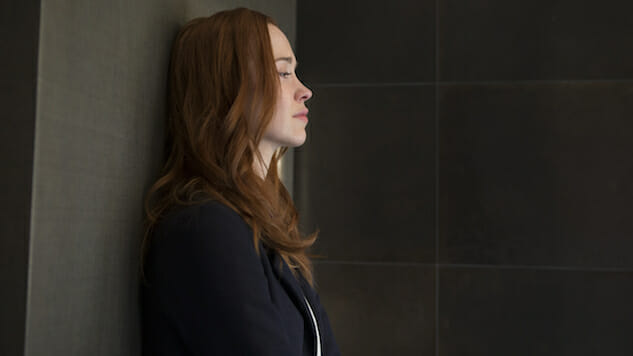WGN America’s Shoot the Messenger Is So Freighted It’s in Danger of Collapse
Photo: WGN America TV Reviews Shoot the Messenger
It doesn’t feel quite right to call Shoot the Messenger a newsroom drama, though technically that’s what it is. It’s not quite right to call it a melodrama, a hero’s journey, a love story, or a family drama, either—though it has elements of each. I’m not sure what to call it, and I’m not sure it needs to fit into a pigeonhole, but I’m also not sure it’s indefinable or genre-bending in a way that’s especially meaningful, either. The acting is really very strong and the premise completely reasonable, so it’s a bit hard to put one’s finger on what it is about this show that makes it a little difficult to praise. It’s not bad.
It’s just kind of lackluster.
Daisy Channing (Elyse Levesque) is a reporter who’s trying to get out of Rookie-town and into the majors, while trying to cope with a lot of family baggage and some personal life issues. In the opening scenes, she witnesses a murder and finds herself in the middle of a story that starts out looking like a drug deal gone bad but quickly enough spirals into a much bigger story that reaches into the city’s deep-pockets bigwigs, politicians, and members of Daisy’s own family. She has the gruff-but-fair support of her editor, Mary Foster (Alex Kingston), and a more experienced and rather cute colleague, Simon Olenski (Lucas Bryant), who’s assigned to team up with her to go after this increasingly complicated story. Plus, she has a kinda-sorta with Detective Kevin Lutz (Lyriq Bent), a relationship that will be tested pretty sorely over what Daisy does and doesn’t tell him about the murder (which rapidly becomes several murders).
I think Shoot the Messenger really wants to be about the complexities of the relationships between journalists and law enforcement. And I think the fact that I’m saying “I think” means maybe what’s going on here is a script problem. There are a lot of subplots jammed into these eight episodes. Daisy has wildly dysfunctional relationships with her mother and her sister, Chloe (Hannah Anderson)—the Golden Child of the family, who’s dating a high-octane politician—and a father with a traumatic brain injury. There’s so much back story in there that eight episodes don’t make enough of a dent in it to make it clear which threads of dysfunction are the ones holding the tapestry together and which are just extraneous embroidery. There’s a turf war in progress between two gangs of Somali teenagers, a lot of difficult relationships with their family members, the local imam, and a sketchy rich dude who might be using these kids to run a little drug empire and, as we begin to see as the series progresses, probably a lot more than that. There are office politics and the artifacts of inter-office romances from the past that leak into the present (Olenski and Foster clearly used to be involved, but I’m not sure why it matters; Simon’s present fiancée is a volatile type, but I’m not sure why it matters; Daisy and Simon’s relationship gets complicated in ways that are pretty predictable, but of indeterminate relevance). Daisy and Chloe’s relationship is so hostile that even the understandable back story we get on that score seems like an inadequate justification for the rancor level. It feels like someone on the script team was afraid there wasn’t enough dramatic tension and turned up the Ancient Resentments Some Justified Some Not knob all the way to eleven.
It’s… a lot. I think maybe it’s too much. Rookie reporter looking to make her first big byline stumbles onto something bigger than she ever imagined? Sure. Life-work balance being challenged by the increasingly personal nature of the case? Sure. People in the corridors of power and the big corner offices being implicated and creating shockwaves that aren’t as simple as “cops need to capture murderer; reporter wants scoop”? Yes, sure. Romance erupting between people who aren’t telling each other everything? Of course. But there is only so much weight a conspiracy plot can bear, and this one is so freighted it’s in constant danger of collapse.
If you are someone who is always looking for a crime drama to soak in, I’m not saying to avoid this one; by all means, come for the largely excellent performances and be prepared to be frustrated with the signal-to-noise ratio. For my money, way too many doors are opened for an eight-episode series, and it’s a bit like being stuck on a plane next to someone who’s wearing way too much perfume. It might even be your favorite perfume, but it’s overwhelming and gratuitous. There is a sleeker, tighter, more toned, more clear-headed and potentially more fascinating show desperately trying to bust out of this one. Shoot the Messenger has many things to recommend it. It’s quite bogged down by a muddy script. If the plan is for a second season to continue this story, and it seems like that must be the intention, I hope the writers will think hard about what they really want viewers to care about, and home in on that with ruthless fat-trimming of anything that doesn’t support complexity and clarity. There’s a good show in here. But I don’t think they’ve quite located it yet.
Shoot the Messenger premieres tonight at 10 p.m. on WGN America.
Amy Glynn is a poet, essayist and fiction writer who really likes that you can multi-task by reviewing television and glasses of Cabernet simultaneously. She lives in the San Francisco Bay Area.